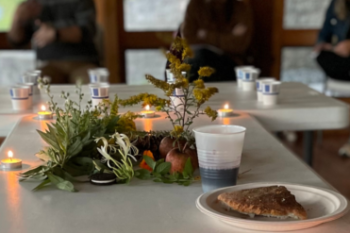Lent: An Invitation to Live in God’s Time
The season of Lent “reminds us to live in God’s time and not the world’s time,” observes Katy Lines (ECS, ’98), pastor at Englewood Christian Church in Indianapolis. It places our personal and communal stories within the larger narrative of Jesus’s life, death, and resurrection. In recent conversations with the MRC, Lines and Derek Sweatman, pastor at Atlanta Christian Church, reflected on the value of observing Lent and holding Ash Wednesday services for their congregations. As ministers in Independent Christian Churches, they are attuned to both the challenge and gift of incorporating these practices into congregational life. Both have found observing Ash Wednesday and Lent enriches their communities’ spiritual formation and enables them to experiment with new practices.
Ash Wednesday
The Lenten season, the forty days of preparation and fasting leading up to Easter Sunday, typically begins with an Ash Wednesday service. Traditionally, congregants are marked with the sign of the cross and admonished to remember their mortality during this service. Sweatman describes the service: “When we brush the ashes across the heads of our people, they hear the words, ‘Remember that you are dust, and to dust you shall return.’ It’s a somber beginning.” But it is also a fitting beginning for a season that, in Sweatman’s words, “helps the church remember its own humanness, and its reluctant grounding in its own brokenness.” An Ash Wednesday service is a poignant reminder that “we are not as untouchable by suffering and death as we often imagine ourselves to be, but we are, instead, participants in this deadly mystery we call life.” This reminder of our mortality connects us to the suffering of others, especially the suffering of Jesus, who embraced mortality for the sake of humanity.
Lent “helps the church remember its own humanness, and its reluctant grounding in its own brokenness.”
As well as connecting us with the humanity of Christ, Ash Wednesday and the season of Lent help Christians mark time differently, attuning our calendars to the rhythms of Jesus’s own life. Lines points to the importance of observing Ash Wednesday in grounding and reorienting the way we mark time as Christians: “I believe that the holy days of Ash Wednesday and Lent and the church seasons are more important than things like Thanksgiving and 4th of July and Memorial Day.” They remind us that “our identity is first and foremost as the people of God, and that is what should be shaping us.” Lines acknowledges that “all time is sacred because all time bears the presence of God in it, but we build in particular points to remind us of particular points in the story of Christ and the story of our lives together in Christ.” Holy days like Ash Wednesday call us into particular moments of Jesus’s life, as well as the life of the church throughout history and around the world.
Observing Ash Wednesday also connects us with other Christians who observe the practice, regardless of denomination. Sweatman shares, “I have found that in adopting these more traditional church practices we have actually widened our reach and relationships with churches unlike us.” It has helped their congregation build unexpected friendships with local Anglican churches and given them a wider appreciation of the Christian tradition. Sweatman describes, “It has allowed us to extend our Christian life to other types of churches, and to develop a liturgical fluency with our neighbors in other traditions.”
Planning an Ash Wednesday Service
For a church interested in observing Lent but unsure how to begin, Lines recommends an Ash Wednesday service as a good starting point. Trying to incorporate an entirely new season into a congregation’s life may feel daunting to both congregants and ministers. However, a one-time service holds less pressure. “There is more openness to out of the box things” like responsive prayers, kneeling, or coming forward to receive ashes. The most important part of introducing this into a congregation, though, is clarity of purpose. Explain the imposition of ashes, connecting it to the community’s formation “in the image of Jesus together.”
In terms of resources for an Ash Wednesday service, both Lines and Sweatman encourage borrowing materials from “people who have done this for a long time,” whether other ministers or other denominations. Atlanta Christian Church follows the order of service in the Book of Common Prayer. “We took our cue from other liturgical churches on these services,” Sweatman explains, “and did what we could to honor the traditions within our own parish community.” Lines suggests using traditional prayers and liturgies but adapting them to “incorporate the essence of who you are” as a community into them. Above all, the service should speak to who and where the community is, inviting them to see their lives as interwoven with Jesus’s journey of teaching, healing, suffering, death, and resurrection.
“When we allow Christian practices to schedule our lives, we say that the kingdom of God is more essential to our lives than the orders of this present world.”
Dr. David Kiger, ECS Theological Librarian, echoes Lines and Sweatman on the value of Ash Wednesday and Lent for congregations: “Our world today forms us into rhythms and systems that are not explicitly rooted in the Christian message…For Christians, practices of Lent and Ash Wednesday help foster Christian formation into the kingdom of God. These practices remind Christians of our mortality, our sins against God and neighbor, and our need for God as our savior. We are also tied into the great tradition of Christian faith, and the reign of God throughout the ages. When we allow Christian practices to schedule our lives, we say that the kingdom of God is more essential to our lives than the orders of this present world.”
The Calvin Institute of Christian Worship has compiled a list of resources for congregations wanting to explore Lenten practices.
This is the first part of a series the MRC will feature during the season of Lent.
Laura Hicks Hardy is the Seminary Program Coordinator at Emmanuel Christian Seminary at Milligan. View Emmanuel’s Academic Programs page here.




